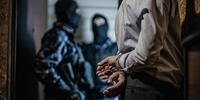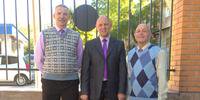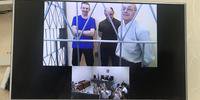Case of Zhukov and Others in Sevastopol
- #
In Sevastopol, a criminal case is being initiated against Vladimir Maladyka, Yevgeniy Zhukov and Vladimir Sakada under Part 1 of Article 282.2 of the Criminal Code of the Russian Federation (organization of extremist organization activities).
- #
Searches are being conducted at least 9 local residents. The security forces take five believers away for interrogation.
The investigator sends the Maladyka spouses for compulsory examination in a neuropsychiatric dispensary because of a bag of milk powder found at their home, which seemed suspicious to the operatives.
- #
The Leninsky District Court of Sevastopol sends Vladimir Maladyka, Yevgeniy Zhukov, Vladimir Sakada and Igor Schmidt to pre-trial detention center No. 1 of Russia in the Republic of Crimea and the city of Sevastopol.
- #
Believers say that they did not receive letters in the pre-trial detention center for some time. They do not return the Bibles that were taken away for examination.
- #
FSB investigator Alexander Chumakin summons 6 people for questioning. They use Article 51 of the Constitution of the Russian Federation. The investigator claims that by doing so they obstruct his work. For some of the men, Chumakin writes out summonses for several days at once, forcing them to spend their time and money on the road from Sevastopol to Simferopol and back (160 km).
- #
Vladimir Sakada's measure of restraint has been changed to house arrest.
- #
The investigator of the FSB of Russia in the Republic of Crimea A. E. Chumakin attracts Vladimir Maladyka, Yevgeniy Zhukov and Vladimir Sakada as accused.
The Court of Appeal changes the term of detention of Vladimir Maladyka until April 2, 2021.
- #
The Leninsky District Court of Sevastopol leaves Yevgeny Zhukov in custody until May 27, 2021.
- #
Vladimir Maladyka's preventive measure was changed to house arrest.
- #
The case goes to the Nakhimovsky District Court of Sevastopol. It is appointed to Judge Olga Berdnikova.
- #
The judge of the Nakhimovsky District Court of Sevastopol issues a decision to change the measure of restraint for Yevgeny Zhukov to a milder one - house arrest for 5 months and 4 days, or until October 20, 2021. Restrictions and prohibitions have been established for the accused: not to leave the living quarters, not to communicate with other participants in the criminal case, not to use means of communication and the Internet, not to receive or send correspondence.
The judge also extends the term of house arrest for Vladimir Sakada and Vladimir Maladyka for 6 months - until October 20, 2021.
- #
Dmitry Shevchenko, senior detective of the FSB of Russia for the Republic of Crimea and the city of Sevastopol, is being questioned as a witness for the prosecution. He informs the court that he has been familiar with the activities of Jehovah's Witnesses in Sevastopol since 2015. Shevchenko says that the services of Jehovah's Witnesses have always been exclusively religious in nature - they consisted of chants, prayers and analysis of Bible verses. He notes that the religious activities of Jehovah's Witnesses were officially registered by the Ministry of Justice of the Russian Federation.
The witness reports that he personally carried out operational-search activities. With the help of "undercover collaborators," he obtained videos of worship services of local Jehovah's Witnesses.
In his testimony, Shevchenko refers to the results of the "Examination on Cases of Extremism and Terrorism", according to which experts did not reveal signs of extremism and incitement to religious hatred, and on the video recordings of worship there were no statements about the exclusivity of Jehovah's Witnesses in relation to other people and religions.
Shevchenko also reports that he is not aware of any evidence that Zhukov, Sakada and Maladyka ever encouraged anyone "to refuse to perform civil duties and serve in the army, to disobey the authorities." The witness says that he has no evidence that the defendants called on anyone to alienate personal material goods free of charge in favor of any extremist organization.
Shevchenko himself considers Jehovah's Witnesses to be Christians and agrees that the religious teachings of Jehovah's Witnesses are not prohibited, and they have a constitutional right to practice their faith.
- #
The court reviews the evidence. Vladimir Sakada draws the attention of the participants of the trial to the fact that not a single edition of the Bible listed as evidence is on the list of extremist materials. The court also checks whether the believer's computer has the Zoom program installed.
- #
As a new measure of restraint, believers choose a ban on certain actions.
- #
A psychologist from a non-governmental non-profit institution of Tatarstan, one of the three experts who conducted a comprehensive psychological, linguistic and religious forensic examination, is being interrogated. The specialists were presented with 4 discs with recordings of divine services and their transcripts.
According to the expert opinion dated February 15, 2021, the data from the disks indicate that Vladimir Maladyka was an active participant in the services. However, the conclusion does not provide any arguments to support this. When the expert is asked to name the specific actions of the believer on the date of the service, the specialist says that it was based on a "set of materials" and therefore cannot name such facts. The expert considers the prayer that the believer said at the end of one of the meetings to be the main evidence of "guilt".
Defendant Vladimir Sakada draws the court's attention to the fact that "the video recordings of the services made by the operational officer were subsequently subjected to unauthorized changes and after that were provided to the experts and the court." He requested that the video recordings be verified.
- #
The court attaches to the case file additions from the defense: a video recording of the search in the liturgical building and the planting of literature.
The defense asks the court to appoint an examination to establish whether changes have been made to the video recording of the services. The judge refuses.
- #
The prosecutor requests 7.5 years in prison for the defendants with an additional ban on participation in public associations for a period of 8 years.
The lawyer gives the court arguments proving that the actions of believers lack not only the composition, but also the event of the crime itself.
The preliminary date for announcing the verdict is October 3, 2022.
- #
All believers deliver the last word. The announcement of the verdict is scheduled for October 3.
Vladimir Sakada emphasizes: "My secular and religious life does not harm other people, the state and the environment, but only serves as a good example for others."
Evgeny Zhukov says: "For me, it doesn't matter what kind of character, height, weight, skin color and eye shape a person has. I try to look at people as Jehovah God sees them."
Vladimir Maladyka is perplexed: "The Supreme Court of the Russian Federation did not ban the religion of Jehovah's Witnesses, which means it did not forbid me and my friends to discuss biblical issues. And no legal entity is required for such conversations."
The last word of the defendant Vladimir Sakada in Sevastopol The last word of the defendant Yevgeny Zhukov in Sevastopol The last word of the defendant Vladimir Maladyka in Sevastopol - #
- #
An appeal hearing is underway in the Sevastopol City Court in the case of Yevgeny Zhukov, Vladimir Sakada and Vladimir Maladyka. Everyone is allowed into the courtroom - about 40 people.
The Judicial Collegium, chaired by Gennady Nikitin, listens carefully to the participants in the trial.
At the request of the defense counsel, the court attaches to the case file the full transcripts of the interrogations of the religious scholar and psychologist, since they are presented selectively in the case file. The Collegium refuses to listen to the full audio recording of their interrogation, but asks the lawyer to voice in his speech important points that are not in the official text.
Another lawyer draws the court's attention to the absence of extremism in the motives of the defendants: "In exercising their right to freedom of religion, they were guided in their actions by love and care for their neighbors, which the court of first instance overlooked."
The defendants attended the hearing via video conferencing. During the break, they were able to see friends gathered in the hall.
- #
- #
It becomes known that Vladimir Sakada, Vladimir Maladyka and Yevgeniy Zhukov were taken to places of serving their sentences.
- #
Vladimir Maladyka is taken to a penal colony in the Tambov region, 1,600 km from home. The believer is quarantined.
- #
It becomes known that Yevgeny Zhukov is in a penal colony in Yaroslavl. He will be quarantined until December 27.
- #
Vladimir Sakada arrives at penal colony No. 5 in the Kaluga region.
- #
Vladimir is kept in a barracks for 50 people. The room is warm. The believer does exercises every morning. He has normal relations with the administration and cellmates. Maladyka works in the industrial zone - prepares metal products for painting.
Vladimir has not yet seen his wife. But he finds support in the letters he receives regularly, as well as reading the Bible.
- #
The colony in which Yevgeny Zhukov is being held is in good condition. It is warm and tidy. Eugene himself contributes a lot to this - he sets an example of cleanliness and accuracy to others. He has good relations with both the administration of the colony and the prisoners. Yevgeniy works in the construction team, and also studies at vocational schools, mastering firefighting.
A believer in a colony has a Bible. The letters have not been received since December 2023 for technical reasons, but Yevgeniy still has old letters and is rereading them. He also reads books from the colony's library.
In his free time, Evgeniy likes to look out the window and watch the snowfall. He lived in the Crimea for a long time, and now he likes snow and coniferous trees. He tries to see the beautiful in everything.
- #
Vladimir Sakada is being held in a barracks for 80 people. He can visit the bathhouse and wash his clothes.
The believer's relations with the administration and other prisoners are conflict-free. The food is good.
Vladimir has a Bible from the colony's library. He is also given about 10 letters a month, and the believer is grateful for his support and encouragement. All this helps him not to lose heart.
- #
Yevgeniy Zhukov and his fiancée Tatyana submit an application to the local registry office. The registration of their marriage will take place in the colony, it is scheduled for July 17.
- #
Volodymyr Maladyka tries to maintain a positive attitude. Letters of support help him distract himself from sad thoughts and feel peace and warmth.
The water in the colony is of poor quality and has a persistent swamp smell. According to the believer, it is impossible not only to drink it, but even to brush your teeth and wash your hands. Vladimir is especially grateful for the parcels from his wife and friends, as the quality of food in the colony leaves much to be desired.
- #
Yevgeniy Zhukov and his fiancée Tatyana register their marriage in the colony of Yaroslavl. Guests who came from the Crimea, they have traveled 2,000 kilometers, are allowed to attend the wedding ceremony.

- #
Yevgeniy Zhukov receives letters of support from different countries. Correspondence is received in both paper and electronic form. Yevgeniy is homesick for his family, but he is supported by the words of encouragement from these letters, as well as by reading the Bible.
Recently, the believer suffered from a cold, but now his health has recovered.
- #
The Federal Penitentiary Service of Russia for the Yaroslavl Region informs the wife of Yevgeniy Zhukov that a court hearing on the replacement of the remaining part of his sentence with forced labor is scheduled for October 7, 2024.
- #
Vladimir Maladyka is kept in a barrack with a population of about 50 people. The believer has earned the respect of the colony administration and successfully finds a common language with other prisoners. He has a Bible, he receives letters of support. Vladimir is glad to have the opportunity to see his wife Natalia during long-term dates.
- #
The colony filed an application with the court to establish administrative supervision over Zhukov for a period of 10 years after his release.
According to Yevgeniy, his health is satisfactory. A believer works hard and is valued for. He recently had a date with his wife.
- #
Vladimir Maladyka receives many letters of support, but due to lack of time and problems with lighting, she manages to respond to only some of them. There are 40 other prisoners in the barracks with him. The believer has good relations with the administration of the colony and with other prisoners. Visits with his wife and regular broadcasts from relatives are a great support for him.
- #
The verdict against Maladyka, Sakada and Zhukov has been confirmed once and for all – the Fourth Court of Cassation of General Jurisdiction upholds the decisions of the lower instances. The defense still considers the sentence unjust.
Some of the video recordings examined in the courts have clear signs of editing carried out under unclear circumstances. This justifiably makes them inadmissible evidence.
The defense notes that all forensic examinations and pre-trial investigations in the cases against Crimean Jehovah's Witnesses were carried out for a fee by the same non-profit organization, CMCE, and they were carried out by the same people and almost verbatim repeated each other (including errors, typos, punctuation marks, and the arrangement of words and lines in the text).
- #
Yevgeniy Zhukov changed his place of work. Instead of repair and construction work, he is now mastering a new business — baking bread. Relations with other prisoners are normal. The section where Yevgeniy is kept is clean and warm.
- #
Yevgeniy has been working in the bakery for two months now. Colony staff and prisoners praise him for his delicious bread. Recently, he passed the baker's exam, and also took part in the annual song contest among convicts "Kalina Krasnaya".
- #
Vladimir Sakada is being held in a barracks for 60 people. He assesses living conditions as normal, he tries to maintain cleanliness on an equal basis with others. Every day he walks in the fresh air and does exercises on the parallel bars and on the crossbar near the barracks. Vladimir has a Bible in the Synodal translation. Recently, he had a long meeting with his wife. Letters are still issued in small quantities.
- #
Sakada is granted another extended visit from his wife. The believer works in the production of gift bags and he has been nominated five times for a reward. He is involved in the everyday chores in the barracks. Vladimir is respected for his friendliness and impartiality to everyone, and also because he remains true to his principles in every situation.
- #
Vladimir Sakada is not receiving letters for over 2 months already. The believer finds emotional support in speaking with his wife on the phone.
- #
Vladimir Sakada has been in need of treatment for several months due to an illness he has developed. The believer twice submitted applications to the administration to be examined by a specialist outside the penal colony, but they have not been considered. After his wife appealed, a consultation was scheduled, but it has already been postponed twice. The medication that he has, relieves his symptoms only slightly.
Despite the difficulties with his health, Sakada does not give up. He was encouraged by a recent extended visit from his wife, Svetlana. Also once a month he is given one or two letters from friends.
Vladimir sleeps on the second tier of the bed — he likes it better, because it is warmer there. The heating has already been turned on in the barracks and there is hot water. In September, the believer was trained as a packaging assembler. He was the only one in the group who passed all the exams with excellent results.
- #
Vladimir Sakada received a consultation from a specialist, who confirmed that the disease is in an advanced stage. An operation is scheduled for the end of November. The spouse purchased the necessary medicines prescribed by the doctor and handed them over. However, the paramedic refuses to give out drugs, citing the lack of a prescription. Vladimir goes to work, despite the pain, he is not given a sick leave.
- #
Yevgeniy Zhukov had a long meeting with relatives, which was supposed to take place in September. But then he ended up in the SUS (strict conditions of detention) and is now deprived of the opportunity to work.
There are 2 people in the room with Yevgeniy. It is possible to go outside for a while. After rising, the section closes, and all prisoners spend the whole day in the so-called entertainment room, where there is a TV and smokes constantly. Because of cigarette smoke, Yevgeniy's eyes suffer so much that he had to go to the medical unit. He was given eye drops.
The believer has conflict-free relations with prisoners. Correctional officers treat him with respect.


